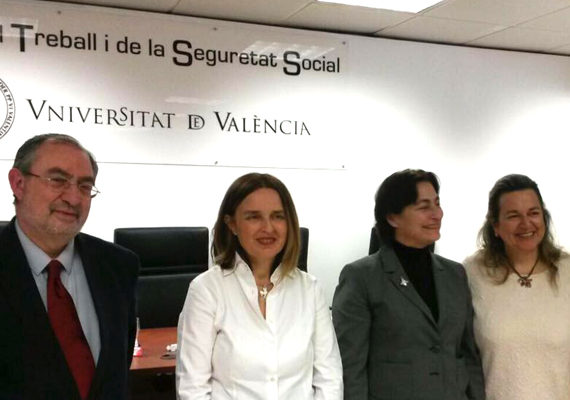
13 april 2016
Last 5th February, with the management of Doctor Isabel Gemma Fajardo-García and in front of a Committee formed by Doctors Jesús Quijano Gonzalez, Jesús Olavarría Iglesia and María José Morillas Jarillo, Patricia Andrea Fernández de Andreani read her thesis titled as Cooperativas prestadoras de servicios públicos: su problemática jurídica (Public services lenders: Its legal problems). She graduated cum laude.
Fernández de Andreani is an Argentinian former student of the previous UV Doctorate program of Law, Business and Justice, given by the Department of Mercantile Law, which is direct predecessor of the current MUDEJ. Now, she expounds briefly the reasons why she chose this topic.
Why talking about cooperatives and its problems?
Cooperatives are consumers and users organisations which join together in order to receive and give a basic and colective need through a jointly owned and democratically controlled business.
This cooperatives are noticed due to their quantitative development in Argentina, taking the lead even at a global level. Its importance is very big in the country, and it also takes part of the regional and national identity.
Regarding to the qualitative importance of these cooperatives we must affirm that the cooperativism of public services is a great contributor in the economical and social development of the regional economy: cooperative use local resources, they contribute in the employment of local people, help to repair the social system and give direct answers to their users and assosiates demands. Likewise, cooperatives use their resources in a caring way, since the one who needs help is linked to the organization; by this way the aid arrives in a more efficient way.
However, in spite of this economical and social relevance, it is an economic model which lacks an apropiate legal regulation. This fact sets out many juridical problems.
Argentinian cooperatives portray most of the regional and national identity
These difficulties have their origin in the lack of the coordination of these different regimes. That is , the cooperative under study. Special regimes such as law governing cooperatives, public service regime and consumer’s right were born in similar or different ways, and they excluded themselves from the rest of the legal system. Thus, we have confirmed that the consumer’s right makes no distinction in presence of an organized cooperative managed by the same users/consumers.
It have been also confirmed that current legislation does not encourage the potencial of these cooperatives nor its formation and development.
Cooperatives are different from other types of enterprises. It is requiered that current law recognizes their distinctive features, hence we consider necessary to adjust the law and concession and licensing contracts to this reality in order to coordinate the legistlation that regulates these entities, promoting the¡r power and recognising them as a own entity.
Analysing the juridical problems of this matter has been the main aim set out in the thesis in order to propose solutions that offers to the cooperatives, its associates and clients a juridical security and also to submit some alternatives that favour a business development.













